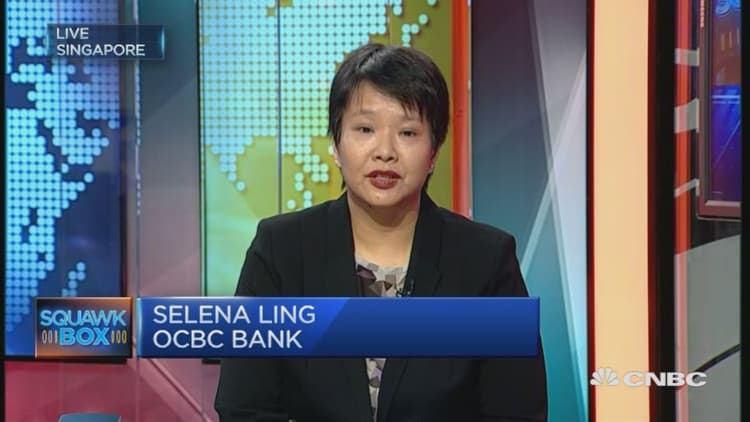Singapore has planted a fresh flag to promote global trade - in stark contrast to what it sees as a "dark shift" toward protectionism in other developed markets.
The city-state's Committee on the Future Economy (CFE) on Thursday released its long-awaited report on how the island-nation will address challenges from stagnant economic growth as key industries, such as trade and commodities, suffered from a slowdown and digital disruption.
The CFE was set up last year to develop strategies to prepare the workforce for economic and social challenges, including digital disruption and an aging population.
The 30-member committee was co-chaired by Finance Minister Heng Swee Keat and Minister for Trade and Industry S. Iswaran, and included cabinet ministers, members of parliament and business leaders. The report will form the basis for Singapore's upcoming budget statement later this month.
Singapore, despite being less than a quarter of the size of the state of Rhode Island, often punches well above its weight diplomatically and can help to set the rhetorical tone for the region. It is Southeast Asia's only country with developed nation status.
But the city-state has long hung its hat on openness to global trade and among the various challenges to the country's economy, the delayed CFE report honed in on recent political developments in the U.S. and Europe.
"Most worryingly, the world saw a dark shift in mood away from globalization in 2016. It no longer seems certain we are on an inexorable course towards greater globalization, stronger multilateral institutions and a more connected world," the report said.
"Instead, we saw nativist politics and protectionist economics growing in strength and influence in Europe and the U.S. The anti-globalization trend will undermine international trade, hurting all economies, but particularly small open ones like Singapore, with two-thirds of our gross domestic product (GDP) generated by external demand."
That followed U.S. President Donald Trump's decision last month to formally pull the U.S. out of the Trans-Pacific Partnership (TPP), which would have created a 12-country Pacific rim free-trade bloc, including Singapore. The TPP, which was negotiated during President Barack Obama's term in office, hadn't yet been voted on or ratified by Congress.
Trump also signalled he planned to renegotiate the North American Free Trade Agreement (NAFTA), enacted in 1994, which eliminated most tariffs between Mexico, the U.S. and Canada.
Following a referendum last year, the U.K. has also moved to exit the European Union trade bloc and in France, nationalist National Front party leader Marine Le Pen, who is opposed to the EU and globalization, has advanced in election polls.
Singapore's CFE, however, said the city-state's future remain focused on developing international ties, although the report placed great emphasis on regional ties as important for future economic growth.

"We must resist the threat of rising protectionism. Singapore must continue to work with like-minded partners," the report said, including "less traditional" ones.
"The U.S. and Europe continue to have innovative companies and people, whom we can work with. We also see strong potential in many Asian markets – in particular Southeast Asia, China and India – as well as in emerging markets farther afield," the report said.
It particularly cited the opportunities from the rise of the middle class and urbanization in Asia.
"We cannot know which industries will succeed," the report said. "What we do know is that Singapore must stay open to trade, talent and ideas and build deep capabilities."
The report offered seven strategies, some of which were previously announced efforts.
One strategy was to continue to work to reduce trade barriers and tariffs, as well as to build further "innovation alliances."
That included tie-ups between universities and foreign and domestic start-ups as well as opportunities for Singaporean students to study overseas. The report also advocated for greater market research across the region, to deepen specialized knowledge of markets.

The report cited existing industrial and business parks the city-state's companies have been developing in India, Indonesia and Vietnam, as well as township projects in China.
In what could represent a cultural shift for Singapore's strong emphasis on education, the report advocated moving away from "the pursuit of the highest possible academic qualifications early in life" and toward life-long learning and retraining approaches.
The report also targeted increasing commercialization of the government's investments in research and development.
The CFE also advocated continuing Singapore's efforts to become a start-up hub in the region, aiming to encourage partnerships between small and large enterprises and improve access to venture capital.
It particularly advised increasing digitization and encouraging it among small businesses. Singapore already has been a global leader in moving government functions online. Going further, the CFE advised developing data analytics and cyber security industries and data science programs.
The CFE also advised greater digital connection with other economies as well as greater infrastructure connections. It cited the continued expansion of the city-state's airport as well as other projects, including a high-speed rail between the city-state and Kuala Lumpur, the capital of Malaysia, its neighbour to the north.
Developing "exportable capabilities," such as research on self-driving vehicles and water technologies, were also cited.



